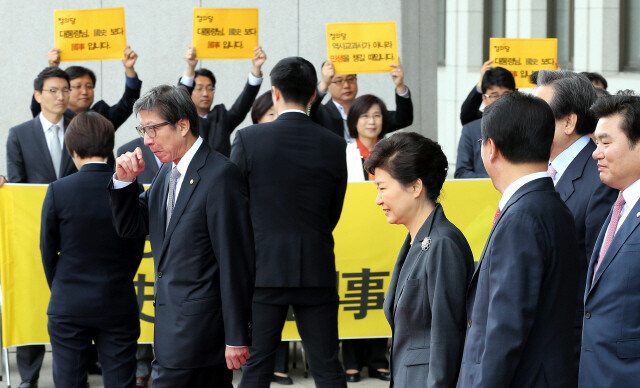hankyoreh
Links to other country sites 다른 나라 사이트 링크
State-issued history textbooks trigger memories for Sewol families

The words “truth” and “memory” are written in the heart of Jeong Hye-suk, 47 who lost her son Park Seong-ho in the tragic sinking of the Sewol. These two words are also the reason Jeong is raising her voice in opposition to the government plan to author history textbooks.
On Oct. 27, Jeong was standing at Gwanghwamun Plaza in Seoul along with the members of the National Alliance for the Promise of April 16, an umbrella group representing the Sewol victims’ families and civic groups. She said, “Since right after the Sewol tragedy, the government and the media have concealed the truth, and the truth has still not been brought to light. While it was agonizing for the entire Korean public, the Sewol ferry is gradually receding from our memory. I’m not sure if the government bungling that was revealed through the accident and the way the victims’ families were crushed will be truthfully remembered in state-issued textbooks.”
While Jeong was speaking, members of conservatives groups nearby were shouting things like “Commies!” and “Stop talking about the Sewol already!”
“See, things are still like this,” Jeong said tiredly.
On Sunday, Jeong and the April 16 Alliance chanted, “We can’t let the state control our memory,” referring to the government’s textbook plans. While the victims’ families did not spend a long time expressing their position, their sincerity was evident as they described how they themselves were suffering memories that were being forgotten because the truth had been distorted.
“I’ve thought a lot about how each part of our memory and history is made. In the past, the strong were able to control history, but now I think that self-aware citizens have become strong. The state cannot define history,” said Hong Yeong-mi, 47, the mother of a boy named Lee Jae-uk, who was also killed in the ferry accident.
“I‘m here today because I think that the government’s attempt to control the people’s memory and their interpretation of history through state-issued textbooks is something that everyone who tried not to forget the Sewol tragedy should try to resist. If they try to frame various interpretations of history as being pro-North Korean, it’s frustrating to think how the Sewol tragedy will be remembered in the future,” said Lee Tae-ho, chair of the April 16 Alliance.
On Sunday, around 30 figures from various fields - including Baek Gi-wan, director of the Institute for National Unification; Lim Heon-yeong, director of the Center for Historical Truth and Justice; and Han Hong-gu, a professor at Sungkonghoe University - added their voices to opposition to state-issued textbooks, calling for the preservation of constitutional values.
Opposition to state-issued textbooks continued with concerts and a rally called “The Government Should Govern, Not Write Textbooks!” which kicked off at Gwanghwamun Plaza, Seoul, on Sunday at 6 pm. The festivities were attended by lawmakers from the opposition party, cultural figures, artists, and members of the general public.
By Bang Jun-ho and Park Su-ji, staff reporters
Please direct questions or comments to [english@hani.co.kr]

Editorial・opinion
![[Column] Park Geun-hye déjà vu in Yoon Suk-yeol [Column] Park Geun-hye déjà vu in Yoon Suk-yeol](https://flexible.img.hani.co.kr/flexible/normal/500/300/imgdb/original/2024/0424/651713945113788.jpg) [Column] Park Geun-hye déjà vu in Yoon Suk-yeol
[Column] Park Geun-hye déjà vu in Yoon Suk-yeol![[Editorial] New weight of N. Korea’s nuclear threats makes dialogue all the more urgent [Editorial] New weight of N. Korea’s nuclear threats makes dialogue all the more urgent](https://flexible.img.hani.co.kr/flexible/normal/500/300/imgdb/original/2024/0424/7317139454662664.jpg) [Editorial] New weight of N. Korea’s nuclear threats makes dialogue all the more urgent
[Editorial] New weight of N. Korea’s nuclear threats makes dialogue all the more urgent- [Guest essay] The real reason Korea’s new right wants to dub Rhee a founding father
- [Column] ‘Choson’: Is it time we start referring to N. Korea in its own terms?
- [Editorial] Japan’s rewriting of history with Korea has gone too far
- [Column] The president’s questionable capacity for dialogue
- [Column] Are chaebol firms just pizza pies for families to divvy up as they please?
- [Column] Has Korea, too, crossed the Rubicon on China?
- [Correspondent’s column] In Japan’s alliance with US, echoes of its past alliances with UK
- [Editorial] Does Yoon think the Korean public is wrong?
Most viewed articles
- 1‘We must say no’: Seoul defense chief on Korean, USFK involvement in hypothetical Taiwan crisis
- 2N. Korean delegation’s trip to Iran shows how Pyongyang is leveraging ties with Moscow
- 3Amnesty notes ‘erosion’ of freedom of expression in Korea in annual human rights report
- 4[Column] Park Geun-hye déjà vu in Yoon Suk-yeol
- 5‘Weddingflation’ breaks the bank for Korean couples-to-be
- 6[Reportage] On US campuses, student risk arrest as they call for divestment from Israel
- 7[Editorial] New weight of N. Korea’s nuclear threats makes dialogue all the more urgent
- 8Why Korea shouldn’t welcome Japan’s newly beefed up defense cooperation with US
- 9[Guest essay] The real reason Korea’s new right wants to dub Rhee a founding father
- 10Will NewJeans end up collateral damage in internal feud at K-pop juggernaut Hybe?